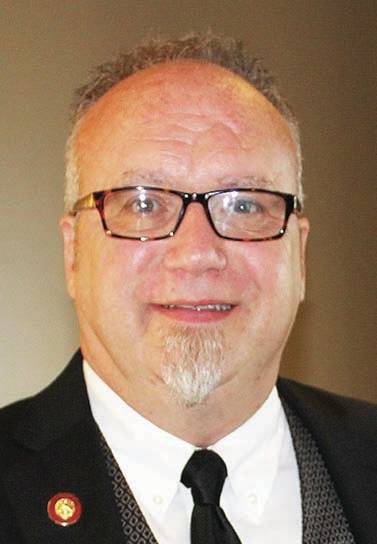BLEVINS: You’ll write and then…
Published 2:43 pm Tuesday, March 2, 2021
|
Getting your Trinity Audio player ready...
|
By Vivian Blevins
Are you the person who observes and can describe what you see, hear, smell, touch? The man holding the “Help Me’ sign at the freeway entrance? The sound of the cricket in your basement? The smell of burning bacon or the toddler who needs a diaper change? The feel of the patchwork quilt your grandmother made?
Are you the repository of family stories?
Know that research has shown that writing has power: the power to heal, to enhance creativity, to bring joy, to preserve those ideas that come in fleeting moments.
I’m teaching creative writing this semester at Edison State Community College, and I’m sharing two of my students’ micro-fiction stories with you (100 to 300 words). You, too, can do this in 15 minutes or so.
You begin with an understanding of something: a person, a story, a setting, a point of view. From there, your imagination takes flight and the words come. You can be using a yellow legal pad, a computer, the back of an envelope. And you write. Don’t be concerned at this point about spelling, punctuation, grammar. All of that can be addressed later. Tell the story as only you can.
If it’s a family story, pay no attention to anyone who says, “But that’s not the way it happened” or “You shouldn’t use our family in your stories.”
I want to share with you two of the very-short stories my students have written recently. I think you’ll like them.
“INTERROGATION” by Audrey Clagett
The bag over my head stunk. My knees were in my chest and my hands were bound together. Suddenly, the bag was ripped from my head and a bright light blinded me.
“I’m gonna ask only once. Where were you on the night of the fifth?” a small gruff voice yelled.
I looked at my accuser. He wore a curious ensemble: sunglasses engulfed his face, barely supported by his small, thin nose. His hair had way too much gel in it, and he was practically swimming in his suit jacket.
“What are you doing?” I asked.
“I’ll ask the questions here. Now, Mr. Teddy, he said, turning to his assistant, the briefcase, please.”
Mr. Teddy sat still, never reaching for the case in front of him, with the same smile plastered on his shaggy face.
The man grabbed it himself.
“Look familiar? Our surveillance caught you carrying it outside the evil corporation.”
He opened it. Scattered inside was Monopoly money and colorful game pieces.
“We know you took the bribe!” the man screamed.
“Yeah, sure.”
“Don’t get smart with me!”
He reached into his pocket, pulled out a squirt bottle, and sprayed me in the face.
“Okay, I’m done playing your game,” I said.
“You’re the one playin’ games, punk!”
I pulled the scarf off from around my hands and stood up.
“No, I’m done playing.”
“Wait, no, James. You said you’d play with me today!” he pleaded.
He stood, hugging his teddy bear to his chest. His sunglasses slipped to the end of his nose, revealing sad eyes. There was no way I could resist that face.
I sat back down.
“So, how did you figure out my evil plan?” I playfully asked.
My little brother smiled.
“It was easy, Slick. You left a long trail of clues.”
Did Audrey trick you? I was in O Henry land for a few seconds and delighted as I thought of the cops and robbers games my sons and their cousin Lesa played as children.
“LOW BATTERY” by August Evans
I first noticed the red blinking light in the corner of my eye as I entered my apartment. The words “Low Battery” appeared over the lens of my eye. I sighed as I set my bags down. It seemed that my battery never lasted anymore. When I first got the implant like every other teen, I could run over a week before I had to recharge, but now I had to plug in every night, and at times that wasn’t even enough. Some days, I would have to stop at a communal charger and plug in for a few minutes before I could make it home.
I sat down in the one chair I had in my apartment. I pulled up my memories from the day. The memories popped up like pages from a book. Each page was something I had done or said. I mentally flipped through each one, sorting.
Spilling coffee all over my blazer? Delete. I mentally threw the memory away into the red, pulsing trashcan that stood to the side. Meeting my cute new boss? Save. Tripping on my way out of his office? Delete. I checked the amount of storage I had left. I didn’t have enough storage, so I deleted the memory.
After sorting through all my memories for the day, I went over to my charger. I grabbed the cord and plugged it into the port on the back of my neck. I felt better as the energy flowed into my body.
I knew I couldn’t do this forever. One day, my battery would completely fail, and I wouldn’t be able to hold my charge anymore. When that day came, I would be replaced by a younger, prettier version.
My students often use science fiction in their stories, but always with the human dimension. Evans has explored a society of the future where youth and beauty continue to be valued commodities.
Are you ready to write? Just do it. Writers enjoy commentary, so if you want to encourage these young writers, send me an email, and I’ll forward it to them.






